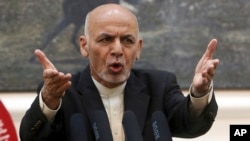Afghanistan has alleged hospitals in neighboring Pakistan are receiving and treating Taliban insurgents who had been injured in recent fighting with Afghan forces in the southeastern Ghazni city.
President Ashraf Ghani, while speaking to a gathering of officials, clerics and residents in Ghazni Friday, also said that militants came from the Pakistani side of the border to participate in the fighting.
Ghani visited the embattled city just days after Afghan forces, backed by U.S. airpower, evicted insurgents from Ghazni to prevent it from falling to the Taliban, though clashes were still continuing in the surrounding districts.
Ghani asserted that Pakistan’s military chief, General Qamar Javed Bajwa, had assured him cross-border insurgent activity would not be allowed.
"General Bajwa, you signed a document with us and told me repeatedly in our conversations over the phone that when the elections [in Pakistan] are over you will pay attention to it. I need answers now. ... From where they came and why are they receiving treatment in your hospitals?" Ghani asked, referring to the July 25 elections in Pakistan.
Pakistan rejects charges
General Bajwa responded to Ghani's allegations late Friday, reiterating that Pakistan is not supporting any terrorist activity inside Afghanistan.
"The alleged return of injured/dead terrorists from Ghazni is incorrect," an official statement quoted the general as saying. However, Bajwa explained, there are scores of Pakistanis, mostly laborers, working in the neighboring country "who periodically fall victim to terrorism acts alongside their Afghan brothers inside Afghanistan."
Terming such victims as terrorists is unfortunate, Bajwa lamented.
The general added different factions of the outlawed Pakistani Taliban are also hiding in sanctuaries inside Afghanistan and transported into Pakistan for medical help under Afghan identities after they are injured or killed in fighting with rival factions or Afghan forces. Bajwa re-emphasized that the Afghan leadership "needs to look inward as the problem resides inside Afghanistan."
On Thursday, Foreign Ministry spokesman, Mohammad Faisal, denied as baseless reports circulating in social media linking Pakistan to the Ghazni conflict, including allegations that insurgents were being brought to Pakistani hospitals.
"We have not received any evidence to back up these spurious accusations and we reject these baseless allegations," Faisal told reporters in Islamabad.
Ghazni attack
The Taliban assaulted Ghazni, the capital of the province also called Ghazni, a week ago and the subsequent several days of clashes reportedly killed around 500 people, including government forces, insurgents and civilians.
The Afghan military at the time alleged foreign militants, including Arabs, Chechens and Pakistanis participated in the fighting, though no proof has been offered to media so far.
Current and ex-Afghan officials twitted a video showing villagers receiving a body of a fighter allegedly killed in the Ghazni fighting and being buried in the middle of the night on the Pakistani side of the border. However, it was not clear from the footage exactly when and where it was filmed.
Speaking Thursday, Faisal explained the steps Pakistan is taking to promote peace and stability to the neighboring country and underscored the need for finding a negotiated end to the Afghan war.
"Pakistan is fencing the Afghanistan-Pakistan border with the objective of regulating the movement of men and material, including narcotics, as part of our counterterrorism efforts," Faisal noted.
The effort, he said, will be important for the long term regional stability and improvement of bilateral relations. The unilateral fencing of the nearly 2,600-kilometer Afghan frontier will be completed by the end of 2018, according to military officials who are supervising the construction effort.
Bilateral dialogue
Pakistan and Afghanistan have recently launched a wide-ranging bilateral dialogue to improve cooperation between their military and intelligence institutions to help counter terrorism on both sides of the border.
Pakistani officials say both sides in meetings under the mutual engagement process, called Afghanistan-Pakistan Action Plan for Peace and Solidarity (APAPPS), have emphasized the need for sharing proof of any illegal cross-border activities instead of indulging in a blame game through media.
The discussions had significantly eased mutual tensions between Islamabad and Kabul and decreased allegations against each other until the Ghazni fighting broke out last week.
Faisal said his country together with Afghanistan is also developing a "time-bound" plan for an early and complete repatriation of nearly three million Afghan refugees still living in Pakistan.
Pakistani military officials maintain security forces in recent years have eliminated all militant sanctuaries on their soil but they blame the Afghan refugee camps for serving as hiding places for "facilitators and abettors" of the insurgents fighting in Afghanistan.





